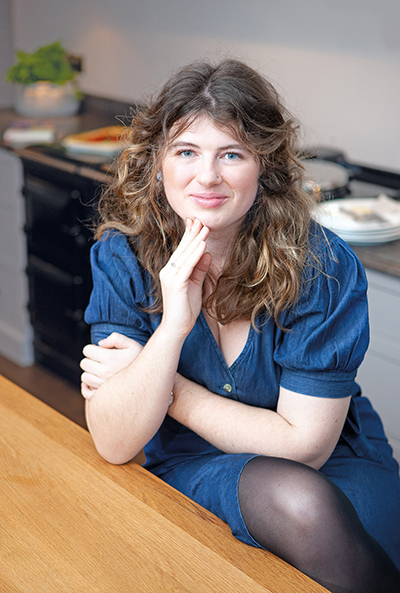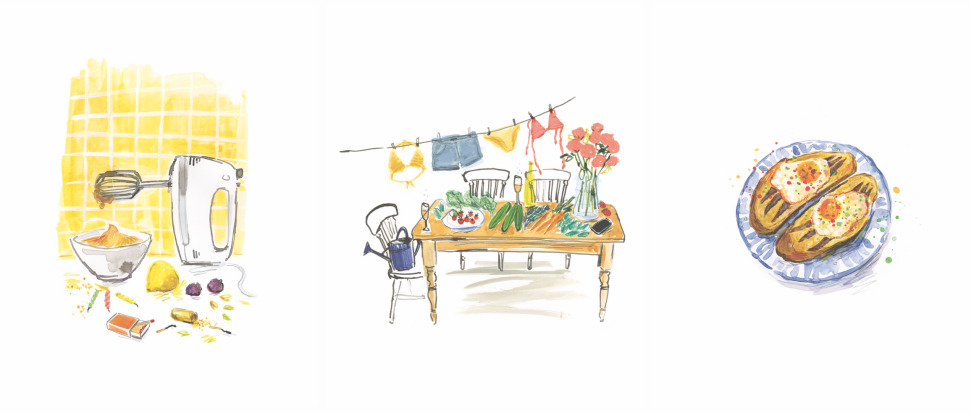Ella Risbridger on The Year of Miracles
Ella Risbridger's new cookbook blends grief, joy, love and loss into its pages – the author talks us through the stories and relationships behind The Year of Miracles
Ella Risbridger, bestselling author of Midnight Chicken, was originally intending to make her second book about dinner parties. After the intense haze of her debut (a half-memoir, half-cookbook documenting her determination to fall in love with living after a suicide attempt) and the loss of her partner at the age of 28, a book about dinner parties, tinkling and bright and cheery, felt like the appropriate tonic. But then, of course, the pandemic happened, and grief continued – as it always does – and instead The Year of Miracles was born. It's a year-long account of the small, everyday wonders of life that can occur in the wake of even the hardest of circumstances.
It might seem a funny place for grief to so unabashedly make its home: a pastel-hued cookbook filled with recipes dedicated to the tactility and sensuality and sheer aliveness of food. But for Risbridger, Miracles was a natural place for both. It is, she explains, an attempt to “bring grief into the forefront. To be like, this is important. This matters.” The kitchen, she adds, is as much a place of death as it is life, of expiry as it is nourishment and energy. “We live in a very sanitised world,” she says, “[but] in the kitchen stuff rots, it goes wrong. I guess that's why a cookbook felt like a good way to talk about death. Everything we eat has a cost.” She pauses to sing a line from the Circle of Life, cracking up. “When you're cooking, you're engaging with this very ancient act of making food to feed yourself and your family. There’s something almost magic about it. I find it very moving.”

Ella Risbridger. Photo: Tim James/Mabel Gray
The result is a book filled with joy and grief simultaneously, wary bedfellows made old friends. It is, as Risbridger knows, near impossible to live a life without experiencing both, and near impossible to write about food without interweaving life, replete with all its charm and loss. “I see people separate the two and I'm like how?” she laughs. “I worry that when we try and take the human out of food and make it one size fits all or objective rather than subjective, that's when we run into trouble. We run into trouble with stuff like putting calorie counts on menus, which is a mad initiative. Or when people cook with an ingredient they’re not culturally familiar with and don't acknowledge they're doing that.
“What we can do is tie together the idea that every food has a story,” she continues, earnest and serious. “Every meal has a story, and only by telling your story and listening to other people's stories are you really going to get a sense of connection.”
This connection is deeply felt throughout Miracles, a book that crackles with the precise warmth and generosity of a dinner party, lockdown or no. Much like in Midnight Chicken, a cast of loving and loved friends flit in and out of the pages. The book, ostensibly taking place through 2020 – although Risbridger notes that it actually compresses three years’ worth of proceedings – is an account of how the author fell in love again after the death of her partner, but is as much a love story between her and her flatmate, to whom the book is dedicated, and the host of other friends who come through her life and kitchen.
Ideas of connection, intimacy, and family have always been broadly conceived across Risbridger’s writing – a year before the pandemic, she wrote a Guardian piece about the centrality of her friendships in helping her cope with grief. Miracles is, in many ways, a manifesto of the alternative, beautiful ways in which households and communities can be formed beyond bloodlines and through food. “The legal definition of household,” Risbridger explains, thinking back to the strictures of lockdown, “is: ‘Do you share one meal a day?’ That’s really beautiful.” During the pandemic, Risbridger would spend hours on the phone to a faraway friend, carving out a daily routine through FaceTime and Zoom. “I'd get up, make my coffee, put Georgie by the toaster and we would just chat through the day and cook on Zoom. It made an intimacy all of its own.”
It feels reminiscent, in some ways, of Greta Gerwig’s observation in Lady Bird, about the relationship between love and attention. “Don’t you think maybe they are the same thing?” Lady Bird’s teacher asks her. In Miracles, a recipe for birthday blackberry miso cake sits happily alongside instructions for takeaways, everything documented with precision to the intimacies that surrounded and shaped each meal. It is a testament to how food is but an exercise in love and attention, an election for joy even in darkness. “Not to sound like, ‘oh, there’s always a bright side’,” Risbridger laughs wryly, “but in my experience there is usually a lesson to be learned, or some nice thing. And I feel confident saying this because some quite terrible things have happened to me. But I wouldn’t change any of them.”
The Year of Miracles: Recipes About Love + Grief + Growing Things is out now via Bloomsbury
Ella Risbridger reads from The Year of Miracles at Ukrainian Community Centre, 14 Royal Ter, Edinburgh, 14 Jun; The Portobello Bookshop, 46 High St, Portobello, 15 Jun
